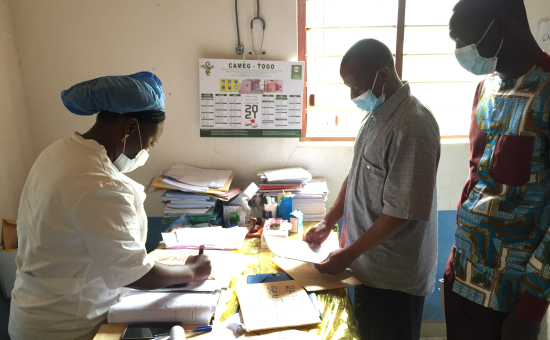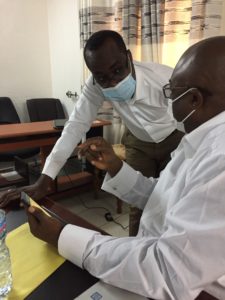
21 Jul Learning from Togo to Improve Malaria Surveillance in Chad
Dr. Nagorngar and Dr. Hakorimana are HRH2030’s Long-Term Technical Advisors to the National Malaria Control Program (NMCP) in Chad; Dr. Julo-Reminiac is HRH2030’s Long-Term Technical Advisor to the NMCP in Togo.
Malaria surveillance—identifying where transmission is occurring to best pinpoint targeted responses to eliminate infections—is crucial to malaria prevention, control, and elimination. The Togolese National Malaria Control Program (NMCP), which has a high level of expertise in malaria sentinel site surveillance, welcomed a delegation from Chad’s NMCP earlier this year, to share best practices in establishing surveillance sites and optimizing the sites’ data for a more effective national malaria response.
Chad NMCP Program Coordinator Dr. Issakha Diar led the five-person delegation, which arrived in Lomé on March 28. The visitors were eager to learn from the experience of their Togo counterparts, as the Chad NMCP is working to establish and operationalize a network of sentinel sites in their own country before the end of the year. These sites will be used as a representative sample of epidemiological areas, which allows broad applicability of data to the whole country. The team was accompanied by two embedded advisors from the Human Resources for Health in 2030 (HRH2030) Program’s Capacity Building for Malaria activity, who have been working to build the capacity of the NMCP to ensure effective implementation of high-quality malaria control services.

Photo: Dr. Mahamat Saleh Diar, Chad NMCP Coordinator (left), and Dr. Tinah Atcha-Oubou, Togo NMCP Coordinator (right).
Togo’s malaria sentinel surveillance network, launched in 2017, is composed of 17 sentinel sites and is the key decision-making tool guiding the country’s malaria response. Quality data is essential to ensure that communities have the right malaria interventions at the right time. At each site, managers have either tablets or Android phones for data collection, which increases efficiency of data collecting and entry, which is done on a weekly basis. All data is validated monthly. The sentinel site data collection tool is accessible and available in real time to all site managers at all levels of the health system. Because of the timeliness and verified accuracy of the data collected, sentinel sites excel in malaria case management, and rarely experience low levels of malaria commodities or stock outs.
The study tour began with presentations by the Togo NMCP on the creation of its sentinel site surveillance network. The Chad team participated in a simulation exercise on data quality assurance using RStudio software, which validates collected data. The team then travelled to the Kpalimé Health District, north of Lome, to visit the Centre Hospitalier Préfectoral in Kpalimé and the Unité de Soins Périphérique site in Agome Yoh which allowed the team to observe the operation of sentinel sites and engage in deep discussions with the sentinel site staff. During these site visits, Togo’s NMCP staff delved into the effective malaria responses in these locations and explained why they rarely experience commodity stockouts. The two main components of this success, they explained to the Chad team, are to ensure that staff are motivated and well-trained, and to encourage effective management. Togo’s site managers skillfully manage their supply chain, stocks, data collection and quality. Proper management of the sites are vital, as epidemiological studies are regularly implemented at these sites to collect data to inform evidence-based decisions and malaria strategies for the country.
According to Dr. Diar, the visit will have a positive impact in strengthening malaria surveillance in Chad. “This trip was an excellent opportunity for theoretical and practical learning, an opportunity to look through the eyes of colleagues in another program to see what works well and what doesn’t, what needs to be changed or improved,” said Dr. Diar. “This visit has enlightened us a great deal, especially around monitoring malaria control activities in a country as large as ours. It is important to decentralize the system to achieve better results.”
In addition, this study tour has strengthened the relationship between the two countries’ NMCP teams, who are part of the larger HRH2030 Capacity Building for Malaria activity. Togo and Chad staff will continue to share technical knowledge as they both make strides toward malaria elimination.
Photo: NMCP Chad colleagues Mahamat Idriss Djsakano, center, and Olivier Nagrdoum, at right, at the malaria sentinel site in Agome Yoh, Togo, with a local staff member.





